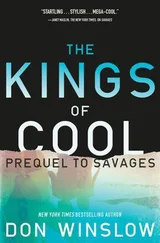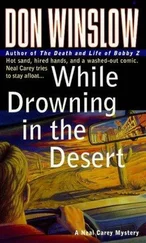Don Winslow - The Power of the Dog
Здесь есть возможность читать онлайн «Don Winslow - The Power of the Dog» весь текст электронной книги совершенно бесплатно (целиком полную версию без сокращений). В некоторых случаях можно слушать аудио, скачать через торрент в формате fb2 и присутствует краткое содержание. Жанр: Триллер, на английском языке. Описание произведения, (предисловие) а так же отзывы посетителей доступны на портале библиотеки ЛибКат.
- Название:The Power of the Dog
- Автор:
- Жанр:
- Год:неизвестен
- ISBN:нет данных
- Рейтинг книги:3 / 5. Голосов: 1
-
Избранное:Добавить в избранное
- Отзывы:
-
Ваша оценка:
- 60
- 1
- 2
- 3
- 4
- 5
The Power of the Dog: краткое содержание, описание и аннотация
Предлагаем к чтению аннотацию, описание, краткое содержание или предисловие (зависит от того, что написал сам автор книги «The Power of the Dog»). Если вы не нашли необходимую информацию о книге — напишите в комментариях, мы постараемся отыскать её.
The Power of the Dog — читать онлайн бесплатно полную книгу (весь текст) целиком
Ниже представлен текст книги, разбитый по страницам. Система сохранения места последней прочитанной страницы, позволяет с удобством читать онлайн бесплатно книгу «The Power of the Dog», без необходимости каждый раз заново искать на чём Вы остановились. Поставьте закладку, и сможете в любой момент перейти на страницу, на которой закончили чтение.
Интервал:
Закладка:
“Where has it gone?” she asks him as the Coltrane solo rises to a crescendo and then falls again.
“Where has what gone?”
“Seven years.”
“Where it’s always gone,” he says. “Doing what there is to be done.”
“I suppose.”
She’s worried about him.
He looks tired, worn down. And, even though they make a joke of it, he’s lost weight lately, and he seems more susceptible to colds and bouts of flu.
But it’s more than his health.
It’s also his safety.
Nora’s afraid they’re going to kill him.
It’s not only his constant political sermons and labor organizing; for the past few years he’s been spending more and more time in the State of Chiapas, making the church down there a center for indigenous Indian movement, infuriating the local landowners. He’s been increasingly outspoken on a range of social issues, always taking a dangerously left-wing position, even coming out against the NAFTA treaty, which, he argues, will only further dispossess the poor and the landless.
He’s even railed against it from the pulpit, angering his superiors in the Church and the right wing in Mexico.
The writing is, literally, on the wall.
The first time she saw one of the posters she angrily went to tear it down, but he stopped her. He thought it was funny, the cartoonish drawing of him with the legend EL CARDENAL ROJO-The Red Cardinal-and the announcement DANGEROUS CRIMINAL-WANTED FOR BETRAYING HIS COUNTRY. He wanted to have one copied and framed.
It doesn’t scare him-he assures her that even the right-wingers wouldn’t kill a priest. But they murdered Oscar Romero in Guatemala, didn’t they? His robes didn’t deflect those bullets. A right-wing death squad marched into his church as he was saying Mass and gunned him down. So she’s afraid of the Mexican Guardia Blanca, and of these posters that encourage some lone nut to make himself a hero by killing a traitor.
“They’re just trying to intimidate me,” Juan told her when they first saw the posters.
But that’s just what scares her because she knows that he won’t be intimidated. And when they see that he won’t, what will they do? So maybe the “request” to resign is a good thing, she thinks. Which is why she floats the idea of his resigning. She’s too smart to overtly bring up his health, his fatigue and the threats against him, but she wants to leave the door open for him to walk away.
Just walk away.
Alive.
“I don’t know,” she says casually. “Maybe it’s not such a bad idea.”
He told her about the argument when the papal nuncio had summoned him to Mexico City to explain his “grave pastoral and doctrinal errors” in Chiapas.
“This 'liberation theology,’ ” Antonucci had started.
“I don’t care about liberation theology.”
“I’m relieved to hear it.”
“I only care about liberation.”
Antonucci’s little finch-like face darkened as he said, “Christ liberates our soul from hell and death, and I would think that would be sufficient liberation. That is the good news of the gospel, and that is what you are supposed to deliver to the faithful of your diocese. And that, not politics, should be your main concern.”
“My main concern,” Parada said, “is that the gospel becomes good news to the people now, and not after they starve to death.”
“This political orientation was all the rage after Vatican Two,” Antonucci said, “but perhaps it has escaped your notice that we have a different Pope now.”
“Yes,” Parada said, “and he sometimes gets things backwards: Everywhere he goes he kisses the ground and walks on the people.”
Antonucci said, “This is no joke. They’re investigating you.”
“Who is?”
“The Latin Affairs Desk at the Vatican,” Antonucci said. “Bishop Gantin. And he wants you removed.”
“On what grounds?”
“Heresy.”
“Oh, ridiculous!”
“Is it?” Antonucci picked up a file from his desk. “Did you celebrate Mass in a Chiapan village last May garbed in Mayan robes, replete with a feathered headdress?”
“Those are symbols that the indigenous people-”
“So the answer is yes,” Antonucci said. “You were openly engaging in pagan idolatry.”
“Do you think that God only arrived here with Columbus?”
“You’re quoting yourself now,” Antonucci said. “Yes, I have that little tidbit here. Let me see. Yes, here it is, 'God loves all humankind-’ ”
“Do you have an objection to that statement?”
“ '-and therefore has revealed his “Godself” to all cultural and ethnic groups in the world. Before any missionary arrived to speak of Christ, a process of salvation was already there. We know in truth that Columbus did not bring God aboard his ships. No, God is already present in all these cultures, so missionary work has a whole different meaning-announcing the presence of a God who is already there.’ Do you deny saying that?”
“No, I embrace it.”
“They are saved before Christ?”
“Yes.”
“Sheer heresy.”
“No, it isn’t.” It’s pure salvation. That one simple statement, Columbus did not bring God with him, did more than a thousand catechisms to launch a spiritual revival in Chiapas as the indigenous people began to search their own culture for signs of the revealed God. And found them-in their customs, their stewardship of the earth, their ancient laws on how to treat their brothers and sisters. It was only then, when they had found God in themselves, that they could truly receive the good news of Jesus Christ.
And the hope of redemption. From five hundred years of slavery. Half a millennium of oppression, humiliation and dire, desperate, murderous poverty. And if Christ didn’t come to redeem that, then he didn’t come at all.
“How about this, then?” Antonucci asked. “ 'The mystery of the Trinity is not the mathematical riddle of Three in One. It is the manifestation of the Father in politics, the Son in economics, and the Holy Spirit in the culture.’ Does this really reflect your thinking?”
“Yes.”
Yes, it is, because it takes all of that-politics, economics and culture-for God to reveal himself in all his power. That’s why we’ve spent the past seven years building cultural centers, clinics, farming co-ops and, yes, political organizations.
Antonucci said, “You would reduce God the Father to mere politics, and Jesus Christ His Son Our Savior to the level of a chair of Marxist Theoretics in some third-rate economics department?! And I won’t even comment on your blasphemous connection of the Holy Spirit to local pagan culture, whatever that even means.”
“The fact that you don’t know what that means is the problem.”
“No,” Antonucci said, “the problem is the fact that you do.”
“Do you know what an old Indian man asked me the other day?”
“Doubtless you’re going to tell me.”
“He asked me, 'Does this God of yours save just our souls? Or does he save our bodies, too?’ ”
“I tremble to think how you might have answered him.”
“You should.”
They sat there across a desk, staring at each other, then Parada let down a bit and tried to explain, “Look at what we’re achieving in Chiapas: We have six thousand indigenous catechists now, spread through every village, teaching the gospel.”
“Yes, let’s look at what you’ve achieved in Chiapas,” Antonucci said. “You have the highest percentage of converts to Protestantism in all of Mexico. Only a little more than half of your people are even Catholic anymore, the lowest percentage in Mexico.”
“So that’s what this is really about,” Parada snapped. “Coke is worried about losing market share to Pepsi.”
Читать дальшеИнтервал:
Закладка:
Похожие книги на «The Power of the Dog»
Представляем Вашему вниманию похожие книги на «The Power of the Dog» списком для выбора. Мы отобрали схожую по названию и смыслу литературу в надежде предоставить читателям больше вариантов отыскать новые, интересные, ещё непрочитанные произведения.
Обсуждение, отзывы о книге «The Power of the Dog» и просто собственные мнения читателей. Оставьте ваши комментарии, напишите, что Вы думаете о произведении, его смысле или главных героях. Укажите что конкретно понравилось, а что нет, и почему Вы так считаете.












